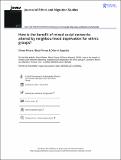Files in this item
How is the benefit of mixed social networks altered by neighbourhood deprivation for ethnic groups?
Item metadata
| dc.contributor.author | Peters, Simon | |
| dc.contributor.author | Finney, Nissa | |
| dc.contributor.author | Kapadia, Dharmi | |
| dc.date.accessioned | 2018-10-02T14:30:09Z | |
| dc.date.available | 2018-10-02T14:30:09Z | |
| dc.date.issued | 2018-07-18 | |
| dc.identifier | 254998684 | |
| dc.identifier | 46a803c4-d5aa-4ef2-9c94-ff335dc94025 | |
| dc.identifier | 85050162139 | |
| dc.identifier | 000554537200007 | |
| dc.identifier.citation | Peters , S , Finney , N & Kapadia , D 2018 , ' How is the benefit of mixed social networks altered by neighbourhood deprivation for ethnic groups? ' , Journal of Ethnic and Migration Studies , vol. Latest Articles . https://doi.org/10.1080/1369183X.2018.1481002 | en |
| dc.identifier.issn | 1369-183X | |
| dc.identifier.other | RIS: urn:AEAFC2953E9D15D1C9E77E9715FF7942 | |
| dc.identifier.other | ORCID: /0000-0001-6602-9920/work/65014555 | |
| dc.identifier.uri | https://hdl.handle.net/10023/16127 | |
| dc.description | This work was supported by the Economic and Social Research Council grant number ES/K002198/1: Understanding changes in ethnic relations: the dynamics of ethnicity, identity and inequality in the UK. | en |
| dc.description.abstract | Previous research has shown that people who are in poverty live in deprived neighbourhoods. Ethnic minority groups are more likely than the White majority to be poor and live in such areas. The likelihood of being poor may be reduced by having access to mixed social networks. But, for those living in deprived neighbourhoods there may be neither opportunities nor resources to form and maintain social networks that are mixed in terms of their ethnic or geographic composition. This paper tests this contention, for ethnic groups in the UK. Specifically, we use the UK's largest household survey to examine the relationship between deprivation and mixing by investigating the following research questions: (1) Does neighbourhood deprivation alter the influence of mixed social network on poverty status? and (2) Is the influence of neighbourhood deprivation and social networks on poverty status equivalent for all ethnic minority groups? Our results suggest that high neighbourhood deprivation tends to over-ride the positive associations of geographically mixed social networks. Moreover, while this result is strong for the White British majority, there is only weak evidence that it holds for ethnic minority groups. This may imply that resource constraints restrict social network benefits, particularly for ethnic minorities. | |
| dc.format.extent | 18 | |
| dc.format.extent | 1728933 | |
| dc.language.iso | eng | |
| dc.relation.ispartof | Journal of Ethnic and Migration Studies | en |
| dc.subject | Mixed social network | en |
| dc.subject | Ethnic group | en |
| dc.subject | Poverty status | en |
| dc.subject | Neighbourhood deprivation | en |
| dc.subject | Understanding society | en |
| dc.subject | G Geography (General) | en |
| dc.subject | HT Communities. Classes. Races | en |
| dc.subject | HM Sociology | en |
| dc.subject | 3rd-DAS | en |
| dc.subject.lcc | G1 | en |
| dc.subject.lcc | HT | en |
| dc.subject.lcc | HM | en |
| dc.title | How is the benefit of mixed social networks altered by neighbourhood deprivation for ethnic groups? | en |
| dc.type | Journal article | en |
| dc.contributor.sponsor | Economic & Social Research Council | en |
| dc.contributor.institution | University of St Andrews. School of Geography & Sustainable Development | en |
| dc.contributor.institution | University of St Andrews. Centre for Minorities Research (CMR) | en |
| dc.identifier.doi | https://doi.org/10.1080/1369183X.2018.1481002 | |
| dc.description.status | Peer reviewed | en |
| dc.identifier.grantnumber | ES/K002198/1 | en |
This item appears in the following Collection(s)
Items in the St Andrews Research Repository are protected by copyright, with all rights reserved, unless otherwise indicated.

